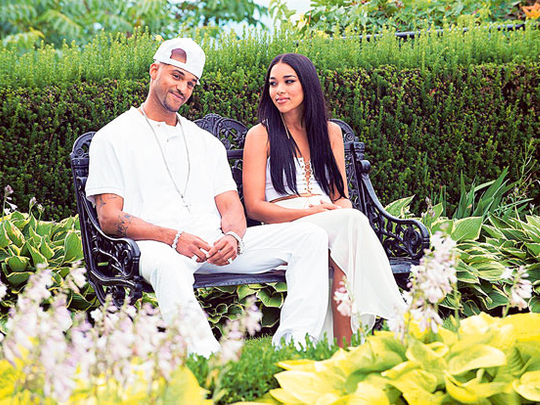
Though R&B singer Aaliyah died 13 years ago at the peak of her fame, her presence can still be felt.
She can be traced to R&B-pop divas like Beyonce, Rihanna and Ciara, and heard in recent genre outliers such as Tinashe, Jessie Ware, Banks and Jhene Aiko. Even rap heavyweight Drake can cite her as an influence.
Aaliyah: The Princess of R&B, an original movie airing on Lifetime on Saturday, traces the rise of the music and film ingenue, whose breakout year ended with her tragic death at age 22 in a plane crash.
“A movie had never been done, which frankly to me was surprising,” said producer Howard Braunstein (The Informant!). “In only 22 years she has this amazing story.”
Though the singer-actress affectionately known as “Baby Girl” remains beloved, there was an immediate backlash when the network revealed plans for the biopic in June. Fans protested the casting of the film, going as far as drafting online petitions to admonish the initial choice of Disney star Zendaya Coleman to portray Aaliyah.
The singer’s family also disapproved of the project, publicly criticising Lifetime and withholding the use of her music from producers. Amid the controversy, Coleman exited due to “production issues,” and Alexandra Shipp from Nickelodeon’s House of Anubis stepped into Coleman’s role, and producers forged ahead.
“[Aaliyah] was so ahead of the time,” said Shipp. “You can hear it in the music, even in the production. She was an innovator, but she didn’t even realise it.”
Braunstein and executive producer Debra Martin Chase (Sparkle) based the film on Christopher Farley’s biography Aaliyah: More Than a Woman, released three months after her 2001 death.
Born in Brooklyn and raised in Detroit, Aaliyah Dana Haughton grew up with ambitions of stardom. She appeared on Star Search at 10 (like Beyonce, she lost) and sang in Las Vegas with her aunt, soul singer Gladys Knight. Record producer and Knight’s ex-husband Barry Hankerson signed the then-12-year-old to his fledgling Blackground Records and linked her with R&B singer R. Kelly, who produced Aaliyah’s 1994 debut, Age Ain’t Nothing but a Number.
Her “street but sweet” brand of R&B, which was eventually bolstered by collaborations with Missy Elliott and Timbaland, helped define ‘90s urban music with slinky dance moves, a breathy falsetto and innovative beats that flirted with numerous genres. Her striking, tomboyish profile and increasing fame also led to a number of high-profile movie roles, including Romeo Must Die and Queen of the Damned (her role in The Matrix sequels was recast after her death).
But in August 2001, a month after releasing her lauded third album, she perished in a plane crash after filming a music video in the Bahamas.
Shipp, just 10 when Aaliyah died, said the opportunity to pay tribute to her idol helped her look past the film’s stormy beginnings.
“This movie is to show how huge she was, how genuine she was, how talented she was, how driven she was,” Shipp added. “The movie celebrates this woman’s life.”
The 23-year-old had little prep time, taking dance classes and recording a number of Aaliyah’s early tunes on weekends during the production. Producers were able to obtain a handful of tracks for use in the movie, including (At Your Best) You Are Love, Got to Give It Up and Journey to the Past, which Shipp performs on-screen.
“I wanted to do the movie justice,” she said.
Though the film is primarily a retracing of her music and film career, it also addresses her controversial relationship with Kelly — which included an illegal (and quickly annulled) marriage when she was 15. During Aaliyah’s life, neither confirmed the marriage, despite court documents surfacing.
The scandal clouded her debut, Age Ain’t Nothing but a Number, and still shadows the career of Kelly, who has faced numerous allegations of sex crimes against underage girls (he was acquitted in 2008 of child pornography and settled other cases out of court).
The Lifetime film depicts their relationship as puppy love between the young singer and her adult mentor and resists the more gossipy tone of some musician biopics.
“I told them, ‘Just get the story right,’” said talk show host Wendy Williams, who was brought on to executive produce the film. “Even though the family didn’t co-sign on this story, we did not disrespect the memory of Aaliyah.”
Jomo Hankerson, the singer’s cousin and president of Blackground Records, has said in interviews that the family’s issue with the film was that it was a made-for-TV project, not a feature film. He also said the network never reached out to consult with the family, who is reportedly also developing a project.
As far as the Lifetime film, producers maintain several conversations with family took place.
“Listen, we reached out to the family several times,” Chase said. “It would have been great to have had their involvement. But first and foremost, we approached this with respect and love. We want to inspire people with her life.”
Braunstein is unsure why the family declined.
“You have to ask them,” he said. “After that, we just moved forward. There wasn’t much more to it than that.”
Everyone involved hopes viewers overlook the film’s shaky start — Chase points to criticism Jennifer Lopez and Jamie Foxx received for ultimately lauded portrayals of musicians — and embrace the film for what it is: a tribute to a singer who never reached her full potential.
“A lot of the criticism has been because people love Aaliyah so much,” she said. “Some of it is to be expected. We all worked really hard to honour her.”











